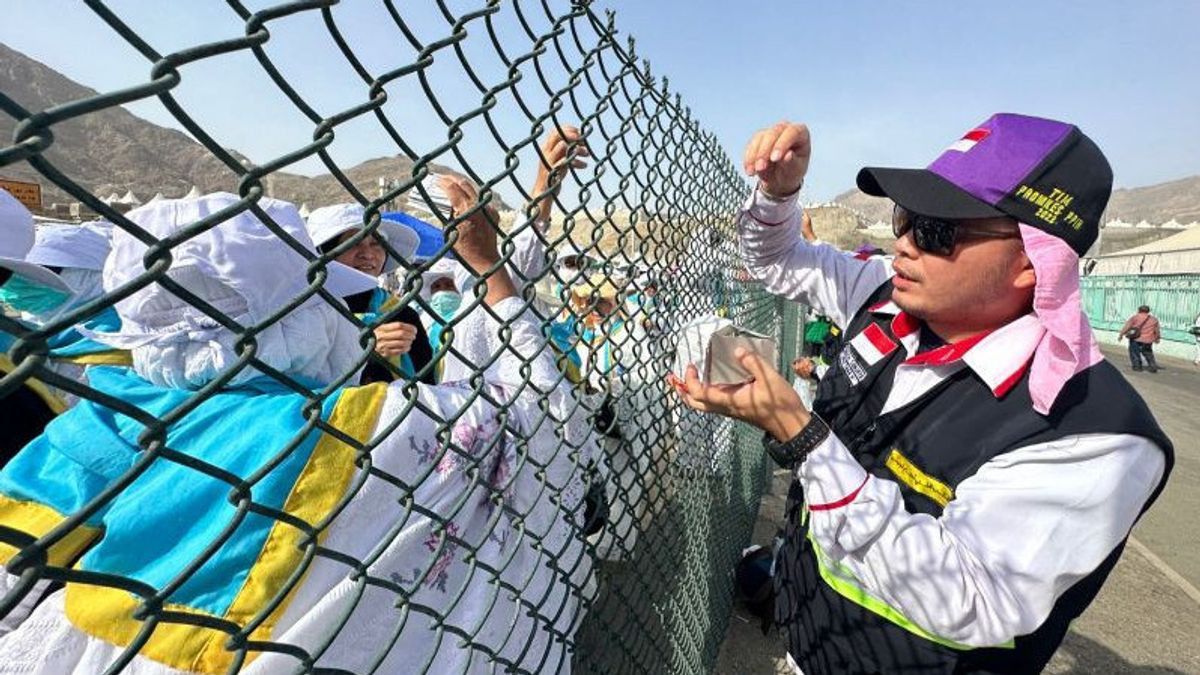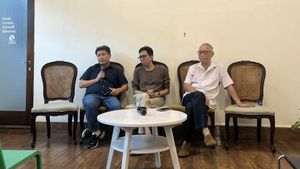JAKARTA - Supervision from the legislative body for the organizers of the 2023 Hajj should be able to provide solution to various obstacles experienced by Indonesian pilgrims. Moreover, this year, there are various obstacles in organizing Hajj which is homework for the Government.
"The DPR's visit to the implementation of the pilgrimage is very appropriate because the DPR's supervision of pilgrims, both special and regular Hajj pilgrims, is very important," said Secretary General of the Muslim Association for Hajj and Umrah Organizers of the Republic of Indonesia (Amphuri), Farid Aljawi, Friday 30 June.
Supervision is needed so that the DPR knows the situation and conditions that occur in the Holy Land. So input for the Government can be an important point as a basis for improving Hajj administrators in the following years.
The reason is, there are various obstacles faced by Indonesian pilgrims. Among other things, services during the Hajj process are caused by the increase in the hajj quota.
"Because this year is the first year after the COVID pandemic and the quota given is full. If you don't make sure it's a good service, it will have a very bad impact on the community, in this case, regular Hajj and special Hajj," said Farid.
The issue of transportation facilities for pilgrims is also known to be in the spotlight of the Indonesian House of Representatives considering that Indonesian pilgrims had been abandoned in Muzdalifah after carrying out wif in Arafah. With the presence of the DPR's Hajj supervisory team at the location, said Farid, this can be directly communicated to the Government as the organizer of the pilgrimage.
"This includes obstacles in the transportation of inter-place services starting from pick-up in Arafah and then to Muzdalifah and Muzdalifah to Mina," he explained.
On the other hand, Farid also highlighted the large number of immigrants in Saudi Arabia who use non-hajj visas but take advantage of facilities for pilgrims. Of course this has an impact on pilgrims who come to carry out the pilgrimage.
"Some use pilgrimage visas whose designations they should not be able to perform the pilgrimage. Non-hajj visa registrants enter using tasrih in various maktabs provided for regular Hajj and special Hajj," said Farid.
"Although the Saudi government itself provides visas related to this, the visa should not be carried out for the pilgrimage. The role of the DPR here can bridge the gap because this interferes with the Government system," he continued.
According to Farid, there are many pilgrims who take advantage of Hajj facilities, such as using the tents of the Hajj pilgrims in Mina. In fact, this includes the Indonesian people themselves.
With the presence of the DPR, this problem can be noted so that the Government can improve policies for the implementation of the Hajj in the future. Because the DPR will discuss obstacles found during the implementation of the pilgrimage in the Holy Land to various related parties.
"So the DPR, especially from Commission VIII of the DPR, can coordinate with the Ministry of Religion, the Ministry of Law and Human Rights in terms of immigration, then with the Ministry of Transportation regarding airlines, and with the Ministry of Health so that the implementation of this pilgrimage is not seen only in terms of implementation but everything starts from the management side," said Farid.
The evaluation given by the DPR RI will also play a very important role in the preparation of the plan for the implementation of the pilgrimage for the following years. That way, according to Farid, supervision can be carried out since the preparation period.
"Since early on, how can people get visas, how can people get quotas. That is reviewed from the evaluation, one of which is carried out by the DPR, so that the role of the DPR in the supervisory function is not only during implementation but also from the time of the discourse," he explained.
This includes the capacity of the tent in Mina. Because Mina's capacity is based on the calculation of one tent with a capacity of around 3,500 for Maktab 11 to 16. This turns out to be around 20,600, of course this is not worth the total quota available," explained Farid.
"From the existing quota of 18 thousand, it's not enough because there are pilgrims from Malaysia and Brunei who are included in our maktab. This makes Mina's capacity over so that it disturbs the comfort of Indonesian pilgrims," he continued.
Farid further hopes that the DPR's direct supervision of this year's Hajj is expected to have a significant impact on Indonesian Hajj organizers in the future.
"Of course, this is our shared responsibility in order to negotiate with the parties in Saudi Arabia," said Farid.
"Don't let the problem arise, for example from special Hajj, it must also be given to the government or from regular Hajj itself, which they both use the same vendors in Saudi Arabia," he added.
Previously reported, the Chairman of the Indonesian House of Representatives, Puan Maharani, emphasized that the Government should have an anticipatory strategy in dealing with emergency situations during the implementation of the Hajj.
"I understand that the government and hajj officers have tried to provide the best service, but there must be improvement efforts so that in the future the implementation of the hajj can be better and does not make it difficult for our Hajj pilgrims," said Puan.
Hajj organizers need to have a crisis management system to anticipate unpredictable things. Puan gave an example of the abandoned Hajj pilgrims in Muzdalifah because of the delay in transportation accommodation.
"The incident in Muzdalifah is indeed out of control. We hope that in the future we will improve the management of the congregation's pick-up shuttle, including for food. How do we anticipate that in unavoidable difficult conditions, the congregation will remain comfortable and safe," said the former Coordinating Minister for Human Development and Culture.
Puan hopes that the Government will swiftly find a way out in the event of an emergency situation so that it can minimize the worst possibility. Such as the traffic density situation that often occurs during the Hajj season, as well as the condition of the congregation's supplies that run low after wusuf in Arafah.
The English, Chinese, Japanese, Arabic, and French versions are automatically generated by the AI. So there may still be inaccuracies in translating, please always see Indonesian as our main language. (system supported by DigitalSiber.id)









